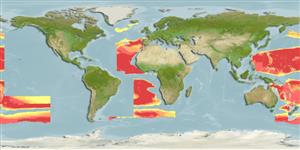>
Saccopharyngiformes (Swallowers and gulpers) >
Monognathidae (Onejaws)
Etymology: Monognathus: Greek, monos = one + Greek, gnathos = jaw (Ref. 45335); bertini: Named for Leon Bertin in recognition of his pioneer contributions to the systematics of this family..
More on authors: Bertelsen & Nielsen.
Environment: milieu / climate zone / depth range / distribution range
Ökologie
seewasser bathypelagisch. Deep-water
Northeast and Southeast Atlantic. Also known from the Southwest Pacific.
Size / Gewicht / Alter
Maturity: Lm ? range ? - ? cm
Max length : 10.3 cm TL Männchen/unbestimmt; (Ref. 34506)
Kurzbeschreibung
Morphologie | Morphometrie
Rückenflossenweichstrahlen (insgesamt): 91-98; Afterflossenweichstrahlen: 43 - 58. M. bertini differs from all other species of the genus by the great distance between anal fin origin and anus (13-19 myomeres). It is further distinguished by the following combination of characters: head short, snout relatively long, skull length 3.6-4.9% TL, rostral fang with dorsal profile slightly convex forming an almost straight line with frontal part of skull, dorsal fin origin above myomere number 5-7, pectoral fin 5.3-10.5% TL and no lateral, subdermal spots of pigmentation (Ref. 34506).
All specimens were caught in the water column far above the bottom (Ref. 34506).
Life cycle and mating behavior
Geschlechtsreife | Fortpflanzung | Ablaichen | Eier | Fecundity | Larven
Bertelsen, E. and J.G. Nielsen, 1987. The deep sea eel family Monognathidae (Pisces, Anguilliformes). Steenstrupia, 13(4):141-198. (Ref. 34506)
IUCN Rote Liste Status (Ref. 130435)
Bedrohung für Menschen
Harmless
Nutzung durch Menschen
Mehr Information
NamenSynonymeMetabolismusRäuberÖkotoxikologieFortpflanzungGeschlechtsreifeAblaichenSpawning aggregationFecundityEierEientwicklung
Alter/GrößeWachstumLänge-GewichtLänge-LängeLängenhäufigkeitenMorphometrieMorphologieLarvenLarven Pop.Dyn.RekrutierungDichteBRUVS
ReferenzenAquakulturAquakultur ProfilZuchtlinienGenetikElectrophoresesVererbbarkeitKrankheitenVerarbeitungNutrientsMass conversion
PartnerBilderStamps, Coins Misc.LauteCiguateraGeschwindigkeitSchwimmstilKiemenoberflächeOtolithsGehirngrößeSehfähigkeit
Tools
Zusatzinformationen
Download XML
Internet Quellen
Estimates based on models
Preferred temperature (Ref.
123201): 2.2 - 2.6, mean 2.4 °C (based on 499 cells).
Phylogenetic diversity index (Ref.
82804): PD
50 = 0.5001 [Uniqueness, from 0.5 = low to 2.0 = high].
Bayesian length-weight: a=0.00102 (0.00046 - 0.00225), b=3.06 (2.88 - 3.24), in cm total length, based on all LWR estimates for this body shape (Ref.
93245).
Trophic level (Ref.
69278): 3.2 ±0.40 se; based on food items.
Fishing Vulnerability (Ref.
59153): Low vulnerability (10 of 100).
